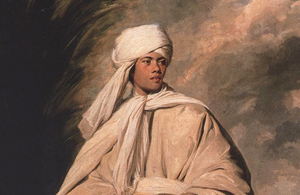Reynolds' Portrait of Omai at risk of leaving UK
A temporary export bar has been placed on the Portrait of Omai by 18th century artist Sir Joshua Reynolds

Painting depicts Pacific Islander Omai who travelled with Captain Cook on HMS Adventure to London in 1774
- Export bar is to allow time for a UK gallery or institution to acquire the painting
- Painting depicts Pacific Islander Omai who travelled with Captain Cook on HMS Adventure to London in 1774
A painting by Sir Joshua Reynolds depicting a Pacific Islander who travelled with Captain Cook on HMS Adventure to London in 1774 is at risk of leaving the country unless a UK buyer can be found. Worth £50 million, Portrait of Omai is a full-length, life-size painting from the 18th century. It depicts one of the earliest and most celebrated Polynesian visitors to England in flowing white Tahitian dress.
The painting is inextricably linked to the great voyages of discovery and exploration during this period. It offers an important insight into the British reception, understanding, and representation of people from beyond Europe at that time in history.
The artist, Sir Joshua Reynolds, was one of the foremost British painters of his day. He became the first President of the Royal Academy and his work and beliefs had a profound impact on subsequent generations of British artists. Portrait of Omai technically exemplifies Reynolds at his best and is a masterpiece of 18th-century British painting.
Arts Minister Lord Parkinson of Whitley Bay said:
The outstanding 18th-century Portrait of Omai by Sir Joshua Reynolds exemplifies the importance of the export bar process. This stunning painting is impressive for its scale, its attention to detail, and the valuable insights it provides into the society in which Reynolds painted it.
I sincerely hope that a UK buyer comes forward to save this iconic painting for the nation.
The minister’s decision follows the advice of the Reviewing Committee on the Export of Works of Art and Objects of Cultural Interest. The committee agreed the painting is one of the great iconic works of the 18th century and is arguably the greatest portrait by one of the greatest British portraitists.
Committee Member Christopher Baker said:
This magnificent British portrait has a global resonance. It illustrates the connectivity of the world in the late eighteenth century through exploration and the spread of colonial ambitions, as well as the fascination that high profile cultural encounters inspired. Mai (c.1753-1779) (or ‘Omai’ as he was called in Britain) arrived in London from his home in Polynesia in July 1774, aboard HMS Adventure, which formed part of Captain James Cook’s second voyage. He was regarded as a celebrity and became the focus of written accounts and images, among which this sensational painting is undoubtedly the most potent.
Reynolds’ picture was exhibited at the Royal Academy in 1776, just after its subject returned to the Pacific. It is a highly romanticised image, illustrating European perceptions, and has a special status in the evolution of grand portraiture of the period. Securing it for a public collection would have profound benefits and allow the numerous and riveting historical and artistic narratives it embodies to be fully developed and shared.
The committee made its recommendation on the grounds that the painting met all three of the Waverley Criteria: being closely connected with our history and national life; of outstanding aesthetic importance; and of outstanding significance for the study of British history and 18th century art and, in particular, for the work of Sir Joshua Reynolds.
The decision on the export licence application for the painting will be deferred for a period ending on 10 July 2022 inclusive. This period may be extended until 10 March 2023 inclusive if a serious intention to raise funds with a view to making an offer to purchase the painting at the recommended price of £50 million is expressed.
ENDS
Notes to editors
- Organisations or individuals interested in purchasing the painting should contact the RCEWA on 0845 300 6200.
- Details of the painting are as follows:
Portrait of Omai
oil on canvas 236 by 145.5 cm. (93 by 57 in.) Sir Joshua Reynolds (1723-1792) painted c. 1776 - Provenance: The artist’s studio sale; Greenwood’s, London, 16 April 1796 (= 3rd day), lot 51,100 gns. to the following, Michael Bryan, from whom acquired by 13 August 1796 by the following, Frederick Howard, 5th Earl of Carlisle (1748–1825), Castle Howard, and by descent to the following, George Howard, 13th Earl of Carlisle (b. 1949), Castle Howard; Sotheby’s, London, 29 November 2001, lot 12 (£10,343,500), where acquired by the present owner. The painting has appeared before the Committee before on two occasions, in December 2002 for a permanent licence that was refused (reported at Case 17 of its 2002/03 annual report) and in April 2012 for a temporary export that was also refused (reported at page 21 of its 2011/12 annual report).
- The Reviewing Committee on the Export of Works of Art and Objects of Cultural Interest is an independent body, serviced by Arts Council England (ACE), which advises the Secretary of State for Digital, Culture, Media and Sport on whether a cultural object, intended for export, is of national importance under specified criteria.
- Arts Council England is the national development agency for creativity and culture. Its strategic vision in Let’s Create is that, by 2030, England should be a country in which the creativity of everyone is valued and given the chance to flourish and where everyone has access to a remarkable range of high-quality cultural experiences. ACE invests public money from the government and the National Lottery to support the sector and deliver the vision. Following the Covid-19 crisis, ACE developed a £160 million Emergency Response Package, with nearly 90 per cent coming from the National Lottery, for organisations and individuals needing support. It is also one of the bodies administering the government’s unprecedented £1.96 billion Culture Recovery Fund.